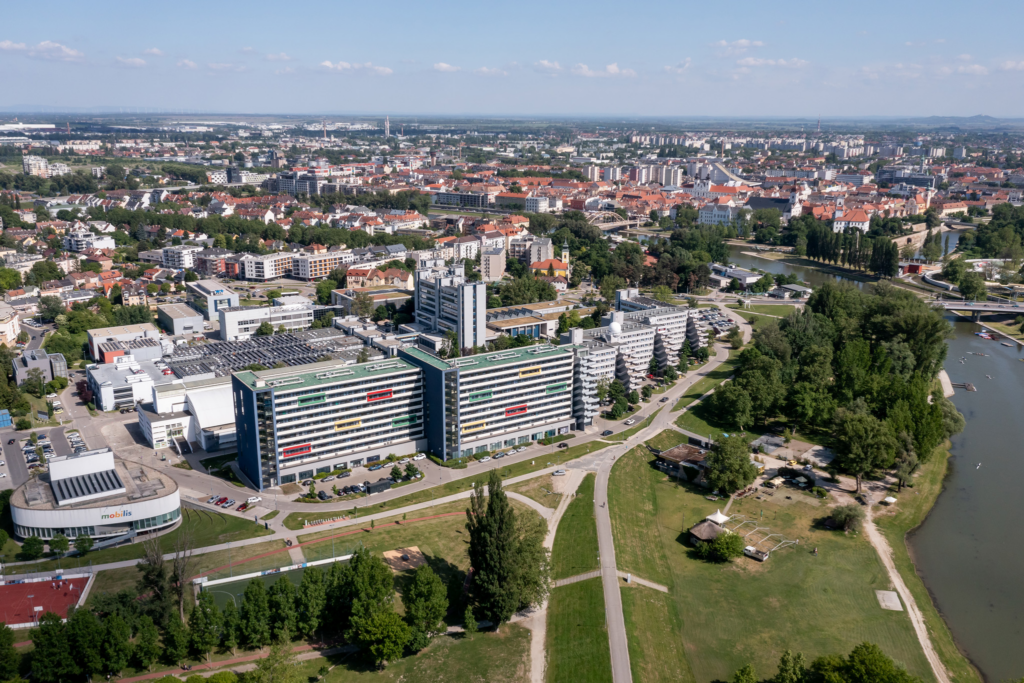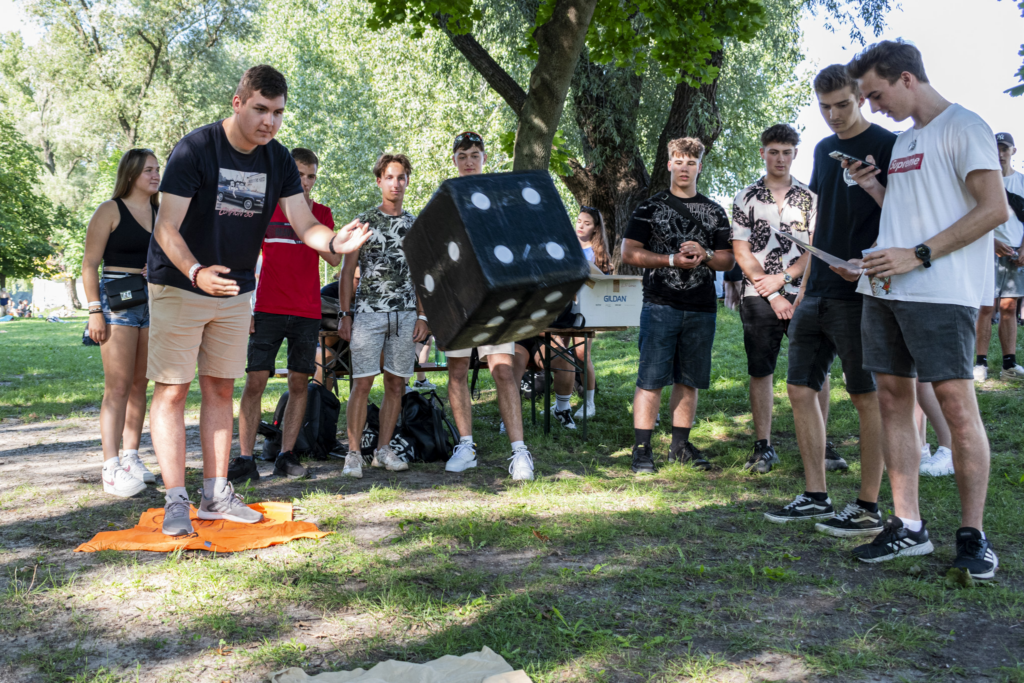A total of 4409 first-year students will start their studies at Széchenyi István University in September. In a significant number of degree programmes, the point thresholds have risen compared to last year, with some courses only being accessible with 487 points. All this shows that there are well-prepared students coming to the institution’s high-quality courses.
From 8 p.m. on 24 July, applicants were notified by text message whether they had been admitted to their chosen institution, and were also able to find out the thresholds on felvi.hu. 4409 of them can look forward to becoming citizens of Széchenyi István University. This is the second highest figure in the last ten years and only 1 percent below last year’s record.
„Congratulations to all those who have been admitted to our university. We are proud to have them as part of our community from September and they can be proud of their achievements. The enrolment numbers and the higher scores show that young people positively value the quality of education, the international infrastructure and the fact that a valuable degree from our institution is the basis for an excellent professional career”, said Dr Bálint Filep, President of Széchenyi István University.
Dr Zsolt Kovács, Vice-President for and Education General Affairs, highlighted that the point thresholds have increased in many majors, despite the fact that due to the change in the rules, last year the upper secondary school leaving certificate could earn up to 100 points, while this year it is only 67 points. While last year, applicants could easily earn at least 280 points with a secondary school leaving certificate, today it was almost impossible to achieve that many points without a higher level school leaving certificate and a secondary language exam. As an example, the Vice-President mentioned that the Hungarian-taught, full-time Vehicle Engineering Bachelor’s degree programme was at 294 points this year instead of last year’s 288, and the engineering informatics Bachelor’s Degree programme was at 310 points instead of 280, but there was also an increase in the Business Informatics Bachelor’s Degree programme. It is interesting to note that the maximum number of points for International Relations has increased to 418, while the maximum number of points for law studies has increased to 487, close to the maximum of 500.
„All this suggests that our University will have well-prepared students starting their studies in September. Based on the data, next year’s applicants are advised to apply with at least an A-level and an intermediate language exam, as this will give them a chance of getting in,” Dr Zsolt Kovács stressed.

The Győr campus of Széchenyi István University – first-year students can expect an international standard of infrastructure and quality education.
Audi Hungaria Faculty of Vehicle Engineering also saw an increase in admission points, which shows that the faculty’s courses are popular with students. The higher threshold also contributes to the quality of the courses. The Hungarian-language bachelor’s degree in automotive engineering and logistics engineering was again the most popular, but there was also considerable interest in English-taught programmes.
The number of students enrolled at the Apáczai Csere János Faculty of Humanities, Education and Social Sciences also increased compared to last year’s outstanding year, which is also true for the teaching degree programme with its long tradition. Curricula in special education continue to be very popular, and stable enrolment figures characterise the humanities programmes. There has also been strong interest from foreign students in the Bachelor of International Studies. In the autumn semester, the Bachelor’s degree in Sociology will be added to the Faculty’s English-language offer, in line with the University’s international strategy.
At the Albert Kázmér Mosonmagyaróvár Faculty, the number of new students increased by 62 percent compared to a year ago. The most popular undergraduate courses are in animal husbandry engineering and food engineering, and a new course in agriculture and business digitalisation is also starting. From the next academic year, three bachelor’s programmes will be available in English language, reflecting the growing number of international students. The popularity of the undivided agricultural engineering programme has been maintained, while the number of applicants to the master’s degree courses has increased significantly. The Faculty is also launching a new national Master’s programme in Agricultural Economics and a new Master’s programme in Environmental, Social and Governance Studies (ESG), the latter of which is very popular.
A total of 460 first-year students will start their studies at the Deák Ferenc Faculty of Law and Political Sciences in six degree programmes and one higher education vocational training programme, which is 13 percent more than last year. There was strong interest in the two traditional core courses – Judicial Administration and Personnel, Labour and Social Administration – and particularly in the Master’s degree programme in the latter. The new Master’s programme in Modern Technologies and Cybersecurity Law, which starts in Hungarian on a correspondence basis and in English on a full-time basis, was also a success, with 37 students enrolled in the autumn. The law programme has maintained its flagship character both in terms of the number of students admitted (more than 200 in total) and in terms of the number of points.
Faculty of Architecture Civil Engineering and Transport Sciences is again very popular this year. The number of applicants has exceeded last year’s figures, which is reflected in the high admission scores. The architecture course remains the most popular, and the civil engineering course has attracted a record number of foreign students. Transport engineering was also in high demand.
The Faculty of Health and Sport Sciences has recruited 36 percent more freshmen compared to last year. The Bachelor of Nursing and Patient Care in Nursing and Midwifery remains popular, as does the Master of Science in Obstetrics and Gynaecology Sonography. It is encouraging to see that the new Master in Health Management, which started in the autumn semester, has also attracted a good number of students. The correspondence courses in the Bachelor of Health Organisation and the full-time and correspondence courses in the Bachelor of Recreation and Lifestyle have started with stable numbers.
At Széchenyi István University, the Faculty of Mechanical Engineering, Informatics and Electrical Engineering again attracted the largest number of applicants this year, and compared to last year, the Faculty’s courses were typically better attended. As has been the case so far, the admission threshold and the average score are higher for full-time courses in engineering and for correspondence courses in IT.
The second highest number of first-year students at Széchenyi University start their studies at the Kautz Gyula Faculty of Business and Economics. As in previous years, the Bachelor of BSc in Business Administration and Management and the Bachelor of Commerce and Marketing remain extremely popular. There was also great interest in the newly launched English-language Bachelor of International Management.
In the Faculty of Performance Arts, both music and design courses – architecture, design, graphic design – have remained popular, especially in the masters courses. The entrance exams show that the students are well prepared. The total number of students admitted to the faculty has increased by 14 percent.

Many people were waiting for the announcement of the scores at the Pon Ott Party at the Bridge Students and Teachers Club of Széchenyi István University in Győr on the evening of 24 July. (Photo: András Adorján)
More English-taught programmes
Széchenyi István University places great emphasis on internationalisation. As part of this strategy, the number of English-language courses will increase by three, to 42 in the academic year 2024-2025. The institution runs five Double Degree programmes with foreign universities – graduates of which will receive diplomas from both universities – and Hungarian students studying these courses in English can also apply for Master’s degrees in tourism management with a Portuguese university and in international management and business with an Indian and an Italian university. The number of Széchenyi University’s international students on self-financed scholarships has increased by 44% compared to last academic year, and the main goal is to double this number by 2030, building on the Stipendium Hungaricum scholarship holder base.
Freshers’ Day on 10 August
According to Dávid Vályi-Nagy, President of the University Student Self-Government, freshmen can expect a vibrant student life and an exciting, diverse and nature-oriented city in both Győr and Mosonmagyaróvár. „We will do our best to help them settle in quickly. This is why, for the second time this year, we are organising a Freshers’ Day for them, which will give them the opportunity to get to know each other and to network with their peers,” he said. The Freshers’ Day will take place on Saturday, 10 August at the Aranypart, Uni by The Rusty Coffee in Győr, with a variety of entertainment.

In addition to Freshers’ Week, this year there will also be a Freshers’ Day for first-year students at Széchenyi István University (Photo: Máté Dudás)






